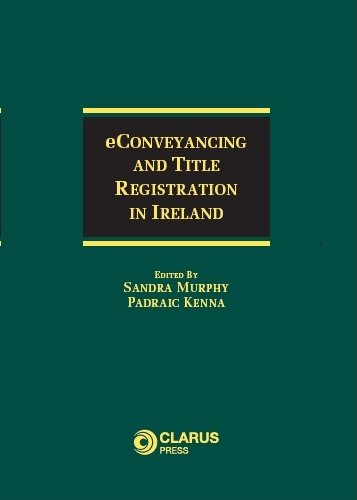 Image 1 of 1
Image 1 of 1


eConveyancing and Title Registration in Ireland
Editors: Sandra Murphy and Padraic Kenna
ISBN: 978-1-911611-13-4
Format and Price: Hardback
Publication Date: 28 January 2019
Electronic conveyancing (‘eConveyancing’) envisages paperless transactions through all stages of the conveyancing process, from pre-sale to post-completion. Designed to simplify, reduce costs and speed up the process, eConveyancing presents significant challenges to traditional systems of conveyancing.
The impact of eConveyancing in common law and civil law jurisdictions has already generated key questions, such as how to reconcile equitable property rights which currently exist ‘off title’ with the new, all-encompassing electronic title register? How do we deal with risk, fraud, indefeasibility of title and related issues in this new electronic environment? Can eConveyancing benefit from Blockchain technology? What are the current key developments in eRegistration for conveyancing and title registration systems?
As the imperative grows to embrace and incorporate technology into conveyancing in Ireland this book offers valuable insights into the issues that have arisen in the transition to eConveyancing.
This highly topical book provides leading Irish and international expert perspectives on eConveyancing, from land law experts, legal practitioners, law reformers and property registration authorities.
Content includes
Introduction: Sandra Murphy
PART 1 REFORM
An Overview of Development of the Irish Conveyancing System, Professor JCW Wylie
eConveyancing: Challenges and Opportunities for Ireland, Dr Gabriel Brennan and Eamonn Keenan (eConveyancing Project, Law Society of Ireland)
PART 2 LAND REGISTRATION
The Development of eRegistration Services in the Property Registration Authority and its Contribution to Government Policy on eConveyancing, Liz Pope (CEO, Property Registration Authority of Ireland)
PART 3 THE EXPERIENCE OF eCONVEYANCING IN ENGLAND AND WALES
The Law Commission and eConveyancing: Updating the Land Registration Act 2002, Professor Nicholas Hopkins (Law Commission of England and Wales)
eConveyancing and Title Registration: Lessons from England and Wales, Professor Martin Dixon (University of Cambridge)
PART 4 BLOCKCHAIN TECHNOLOGY
Blockchain’s Unsuitability for Real Property Transactions, Associate Professor Rod Thomas (Auckland University of Technology)
Block Chain Conveyancing? Professor Peter Sparkes (University of Southampton)
Ownership of Data and the Numerus Clausus of Legal Objects, Professor Sjef van Erp (Maastricht University)
PART 5 CHALLENGES FOR IRELAND
The Law on Adverse Possession and Its Reform: Options and Opportunities Presented by the Introduction of eConveyancing, Dr Una Woods (University of Limerick)
Error and Responsibility, Professor Simon Cooper (Oxford Brookes University)
European Property Law and the Demands of Electronic Conveyancing: A ‘Property in the Margins’ Perspective, Mark Jordan (University of Southampton)
Editors: Sandra Murphy and Padraic Kenna
ISBN: 978-1-911611-13-4
Format and Price: Hardback
Publication Date: 28 January 2019
Electronic conveyancing (‘eConveyancing’) envisages paperless transactions through all stages of the conveyancing process, from pre-sale to post-completion. Designed to simplify, reduce costs and speed up the process, eConveyancing presents significant challenges to traditional systems of conveyancing.
The impact of eConveyancing in common law and civil law jurisdictions has already generated key questions, such as how to reconcile equitable property rights which currently exist ‘off title’ with the new, all-encompassing electronic title register? How do we deal with risk, fraud, indefeasibility of title and related issues in this new electronic environment? Can eConveyancing benefit from Blockchain technology? What are the current key developments in eRegistration for conveyancing and title registration systems?
As the imperative grows to embrace and incorporate technology into conveyancing in Ireland this book offers valuable insights into the issues that have arisen in the transition to eConveyancing.
This highly topical book provides leading Irish and international expert perspectives on eConveyancing, from land law experts, legal practitioners, law reformers and property registration authorities.
Content includes
Introduction: Sandra Murphy
PART 1 REFORM
An Overview of Development of the Irish Conveyancing System, Professor JCW Wylie
eConveyancing: Challenges and Opportunities for Ireland, Dr Gabriel Brennan and Eamonn Keenan (eConveyancing Project, Law Society of Ireland)
PART 2 LAND REGISTRATION
The Development of eRegistration Services in the Property Registration Authority and its Contribution to Government Policy on eConveyancing, Liz Pope (CEO, Property Registration Authority of Ireland)
PART 3 THE EXPERIENCE OF eCONVEYANCING IN ENGLAND AND WALES
The Law Commission and eConveyancing: Updating the Land Registration Act 2002, Professor Nicholas Hopkins (Law Commission of England and Wales)
eConveyancing and Title Registration: Lessons from England and Wales, Professor Martin Dixon (University of Cambridge)
PART 4 BLOCKCHAIN TECHNOLOGY
Blockchain’s Unsuitability for Real Property Transactions, Associate Professor Rod Thomas (Auckland University of Technology)
Block Chain Conveyancing? Professor Peter Sparkes (University of Southampton)
Ownership of Data and the Numerus Clausus of Legal Objects, Professor Sjef van Erp (Maastricht University)
PART 5 CHALLENGES FOR IRELAND
The Law on Adverse Possession and Its Reform: Options and Opportunities Presented by the Introduction of eConveyancing, Dr Una Woods (University of Limerick)
Error and Responsibility, Professor Simon Cooper (Oxford Brookes University)
European Property Law and the Demands of Electronic Conveyancing: A ‘Property in the Margins’ Perspective, Mark Jordan (University of Southampton)